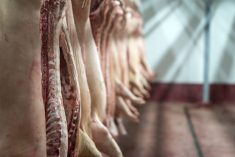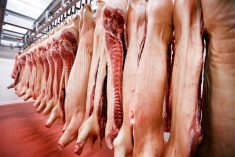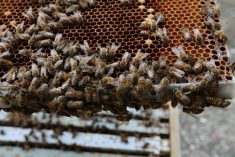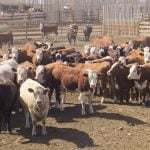The federal government is putting up an eight-figure funding wall to help prevent African swine fever from ever reaching Canada’s hog farms — and to prepare against any breach.
Agriculture Minister Marie-Claude Bibeau said Aug. 26 the government will provide up to $45.3 million toward a three-pronged effort to boost disease prevention and preparedness: pork sector programming, Canadian Food Inspection Agency (CFIA) capacity, and border controls.
Of that amount, $23.4 million is to go toward the Canadian pork industry’s “prevention and mitigation efforts” over a two-year period. That work would include:
Read Also

Ample supplies and improved livestock sector to boost Canadian feed sector: FCC
Abundant feed grain supplies and improved profitability for the livestock sector should support strong feed demand and sales through the winter, says a new report from Farm Credit Canada.
- biosecurity assessments and improvements, including wild pig management;
- economic modelling, scenario analysis, and marketplace assessment;
- swine fever-related research;
- preparedness for “welfare slaughter” and deadstock disposal, including slaughter plant retrofits; and
- evaluation of “high-capacity technologies for humane depopulation of surplus hogs.”
For that part of the funding envelope, program details “are being developed and the program will be launched as soon as possible,” the government said in a release.
Separately, up to $19.8 million of the larger funding package is earmarked for CFIA’s “prevention and preparedness efforts” over a three-year period. Those include:
- boosting surveillance and lab capacity, including rapid diagnostic testing;
- exercises and development of response plans for different scenarios;
- raising “awareness, outreach and communications” to prevent swine fever spread;
- development of “compartments” — that is, a subpopulation of animals free from disease in one or more establishment that share a “common high standard of biosecurity;” and
- facilities, knowledge and expertise to support international partners developing a swine fever vaccine — and to help set up a framework for distribution. There is no known effective vaccine yet against ASF.
That portion will also support the CFIA’s work in setting up zoning arrangements with “additional” trading partners. Such zoning pacts — which in an outbreak are meant to help protect the flow of exports from regions of Canada where a disease has yet to appear — are already in place with the U.S., European Union, Singapore and Vietnam.
The remaining $2.1 million is set to support Canada Border Services Agency (CBSA) border control activities, such as “measures that continue to prevent the entry of high-risk pork and pork products.”
Those include raising public awareness, improving “commercial targeting” and developing policy and procedure training for border services officers.
‘Human behaviours’
African swine fever — not to be confused with “classical” swine fever, also known as hog cholera — is a DNA arbovirus which, in its acute form, is known to cause mortality rates of close to 100 per cent in infected herds of domestic swine, usually within six to 13 days of infection.
The virus cannot transmit from hogs to humans and is not considered a food safety issue.
The virus can also remain viable for long periods of time in infected hogs’ blood, manure and tissues including uncooked or undercooked pork products or processed pork goods such as ham, sausages and bacon.
As the World Organization for Animal Health (OIE) puts it, the ASF virus is also considered “highly resistant in the environment,” meaning it can survive on clothes, boots, farm equipment and tools and other materials.
That means “human behaviours can play an important role in spreading this pig disease across borders if adequate measures are not taken,” the OIE says.
Canada has never had a case of African swine fever, the government noted in its release, but the disease “continues to spread in several regions around the world” and even a “single case” in Canada would “immediately result in the closure of Canada’s borders to pork exports.”
Export sales, the government noted, today account for about 70 per cent of Canadian pork production, which Canadian Meat Council CEO Chris White said makes Canada the world’s third-largest pork exporting country.
ASF is endemic in sub-Saharan Africa and in recent years has spread to wild and/or domestic hogs in Asia — most dramatically in China, starting in 2018 — and parts of Europe. The Americas had not had an outbreak in about 40 years up until cases appeared last year in animals in the Dominican Republic and Haiti.
“Prevention is key to avoid the entry of ASF, but preparedness will allow the pork industry to reduce the impact of the disease for a quicker recovery,” the CMC’s White said in the government’s release.
“We must continue to work as a team — federal, provincial and territorial governments together with industry — to prevent African swine fever from entering the country,” Bibeau said in the same release. “Strengthening the measures already in place is essential to protecting the hog sector and the vitality of rural communities.”
“Manitoba’s hog farmers are pleased that the federal government recognizes the threat that this disease poses not only to our sector, but our economy as well,” Manitoba Pork chair Rick Prejet said Aug. 26 in a separate release.
“We are committed to working in close collaboration across our sector, and with our partners at all levels of government to prevent African swine fever from reaching Canada, while also working to ensure that we have plans to mitigate potential impacts the best we can.”
“While ASF has not been found in Canada, its presence would be devastating to both the pork sector and the overall economy,” Alberta Pork chair Brent Moen said in a separate release Aug. 31, adding Bibeau’s announcement “shows a genuine commitment at all levels of government and within the pork sector” against ASF. — Glacier FarmMedia Network
















